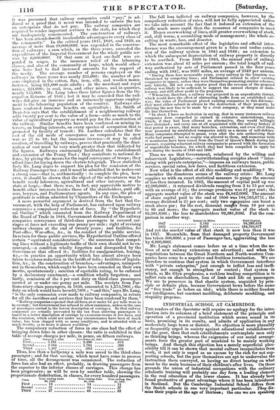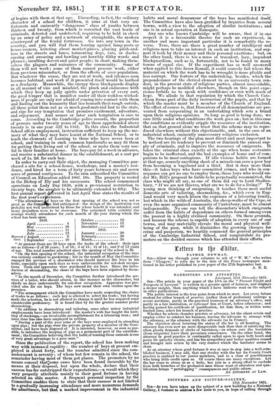INDUSTRIAL SCHOOL AT CAMBRIDGE.
TIIE readers of the Spectator will require no apology for the intro- duction into its columns of a brief statement of the principle and operation of a provincial institution which seems sound in its basis, promising in its results, and admits of application in any moderately large town or district. No objection is more plausibly or frequently urged in society against educational establishments for the poor' than that such establishments contemplate men only as thinking beings, whereas the exigencies of our social arrange- ments force the greater part of mankind to be mainly working beings. And though this objection has a merely superficial plau- sibility till it can be shown that mental culture incapacitates from work, it not only is urged as an excuse by the rich for not sup- porting schools, but the poor themselves are apt to undervalue the instruction there conveyed, as having no direct bearing on what must be the main business of their children's after lives. On these grounds the union of industrial occupations with the ordinary scholastic training will probably one day form a leading- element in the real education of the lower classes. It has already been found productive of great advantage where it has been introduced in Scotland. But the Cambridge Industrial School differs • froin the Scotch schools in one very important particular. They dis. - miss their pupils at the age of thirteen; the one we are speaking of begins with them at that age. Discarding, in fact, the ordinary character of a school for children, it aims at that very un- fortunate and eminently " dangerous " class of youths between thirteen and twenty, from which is recruited the vast horde of criminals, detected and undetected, requiring to be held in check by an army of police and a network of strongholds, the modern counterpart of the feudal fortresses. Go into any town in the country, and you will find them leaning against lamp-posts or house-corners, loitering about market-places, playing pitch-and- toss in the streets and lanes, tormenting dogs, cats, or ducks ; cursing and swearing and bawling out horribly filthy words and phrases ; insulting decent and quiet people; in short, making them- selves the plagues and nuisances of the community. Some of them will not work ; some of them cannot procure work, either from previous misconduct, or from the effects of over-population. But whatever the cause, they are not at work, and idleness soon becomes habitual, and work if it presented itself would be loathed as a drudgery. Meanwhile, the energy these blackguards display in alt manner of vice and mischief, the pluck and endurance with which they keep up jolly spirits under privation of every sort, the good temper that is manifest under all their reckless wicked- ness, if people are only not afraid of coming into contact with them and finding out the humanity that lies beneath their rough outside, all these point them out as so much good material lost to the state, and ripe for any temptation that promises excitement, adventure, and enjoyment. And sooner or later such temptation is sure to come. According to the Cambridge police records, the proportion of persons under twenty years of age to those apprehended above twenty is in one year 522 to 1161. To this class the Industrial School offers employment, instruction sufficient to keep up the me- mory of what they may have learnt at the National School, or to teach the elements of learning to those who have never been at school, and training in such common handicrafts as may fit them for getting their living out of the school, or make them very use- ful to their families at home. The boys pay 2d. a week in advance, and receive a substantial dinner in the establishment, at a cost per week of is. 2d. for each boy.
In order to carry out their object, the managing Committee pur- chased a site for a school-house, workshops, and a master's resi- dence, and hired for a term of forty years between six and seven acres of ground contiguous. To the sum subscribed the Committee of Council on Education added 106/. 10s. The property is vested in the Bishop of Ely and his successors. The school commenced operations on Lady Day 1850, with a provisional restriction to twenty boys, the nu"her to be ultimately extended to fifty. The
first annual report ivered in last April thus states the results of the first year's ex rience.
"The attendance • f boys on the first opening of the school was not so
great as the Com had anticipated : the design of the institution was probably not well un erstood by those for whose benefit it was intended and many prejudices were to be overcome. The subjoined table exhibits the average weekly attendance for each month of the year during which the school has been open.
18.50. October 12 April 4 November 12 May 10 December ....... 16 June 11 1851.
July 12 January 20
Harvest f August 9 February 20 time. September 10 March 24
"At present there are 28 boys upon the books of the school : their ages are as follows-2 of 20 years; 1 of 16 5 of 15; 11 of 14; and 9 of 13 years of age. The total number admitted since the opening of the school is 36. "Oa the first opening of the school, the industrial occupation of the boys was entirely confined to gardening ; but in the month of May the Committee engaged the services of a shoemaker who should instruct the boys in his trade, especially upon such days as were unfavourable for out-door occupa- tions. Tools and apparatus were purchased for six boys. Since the intro- duction of shoemaking,. the shoes of the boys have been repaired by them- selves.
"In the month of December, the Committee further introduced the ser- vices of a tailor, who should attend, in like manner as the shoemaker, but chiefly on days unfavourable for out-door occupation. Apparatus was pro- vided also for six boys. The boys now mend their own clothes upon the premises. "The arrangement whieh the Committee have made respecting the choice of trades is as follows : each boy is allowed to select his trade; but having made the selection, he is not allowed to change it until he has acquired some considerable proficiency. It is found that by far the greater number prefer shoemaking. "In addition to shoemaking and tailoring, some other minor industrial employments have been introduced : the master's wife has taught the knit- ting of stockings,—an invaluable accomplishment for a labouring man ; and some time has also been employed in netting.
"During a part of the year some of the boys were employed in attending upon pigs ; but the pigs were the private property of a member of the Com- mittee, and have been disposed of. It is intended, however, as soon as flos- sible, to introduce the keeping of pigs as a permanent part of the establish- ment; the Committee believing that the habit of tending these animals is one of very great advantage to a poor man."
Since the publication of the report, the school has been making way with increased rapidity : the number of boys at present em- ployed is about forty, and the number admitted since the com- mencement is seventy; of whom but few remain in the school, the remainder having most of them got places. The promoters by no means conceal that:some cases have been found incurable by the means at their disposal, but upon the whole, declare that their success has far outstripped their expectations,—a result which they very properly attribute mainly to their good fortune in having selected an able master. A frequent personal inspection by the Committee enables them to state that their success is not limited to a ually increasing attendance and more numerous demands for *ttance, bat that a marked improvement in the industrial habits and moral demeanour of the boys has manifested itself. ' The Committee have also been gratified by inquiries from several towns, with a view to the adoption of similar institutions ; and one is in actual operation at Ramsgate.
Any one who knows Cambridge will be aware, that if in one respect it is a favourable theatre for such an experiment, in another and more important particular it is remarkably the re- verse. True, there are there a great number of intelligent and religious men to take an interest in such an institution, and sup- port it both by their money and their personal exertions ; but, on the other hand, there is too a mass of truculent, lazy, impudent blackguardism, such as is, fortunately, not to be found in many towns of equal size. If the experiment has so well answered when applied to this flues Romuli it could scarcely fail where the material on which the work has to : be wrought is more pliable and less corrupt. One feature of the undertaking, besides, which the preponderance of the clerical element in an university town ren- ders, in the present state of religious parties, almost unavoidable, might perhaps be modified elsewhere, though on this point expe- rience forbids us to speak with confidence or even with much of hope. We allude to that regulation by which the Church Cate- chism forms part of the daily instruction of the mils, and that by which the master must be a member of the Church of England. The effect of course is, that Dissenters of all denominations are pre- vented from cooperating in an undertaking which sets a brand upon their religious opinions. So long as good is being done, we care little under what conditions the work goes on ; but in this case the conditions so evidently cripple the resources of the institution, that on that ground alone we trust that the scheme may be repro- duced elsewhere without this objectionable, and, in the ease of an industrial school, eminently unnecessary religious exclusion. The two bearings of the plan most direct and most important to be noticed are its tendency to prevent or diminish the annual sup- ply of criminals, and to improve the resources of emigrants. It takes the criminal class exactly at the age when home restraints begin to be ineffectual, and the bad examples of home and of com- panions to be most contagious. If idle vicious habits are formed at that age, scarcely anything short of a miracle can save a poor boy from becoming a vagabond and a thief. But it does more than this—it takes boys who have committed crimes, and who in con- sequence can get no one to employ them, those boys who would un- der Mr. Hill's proposal be liable to be perpetually recommitted, the class who might all say, as one of them did say to Lord Shaftes- bury, "If we are not thieves, what are we to do for a living?" To young men thinking of emigrating, it teaches those most useful domestic arts of tailoring, shoemaking, &c., which even in Eng- land would very much Jessen the expenses of a labouring family, but which in the wilds of Australia, the sheep-walks of the Cape, or even the more organized community of Canterbury, must be almost indispensable. No one can tell the discomforts which emigrants suffer from the habits of dependence on others formed among even the poorest in a highly civilized community. On these grounds, and because the scheme is capable of adoption in every one of our towns, and may materially elevate the moral and physical well- being of the poor, while it diminishes the growing charges for crime and pauperism, we heartily commend the general principles of the Cambridge Industrial School, and congratulate its pro- moters on the decided success Which has attended their efforts.



























 Previous page
Previous page